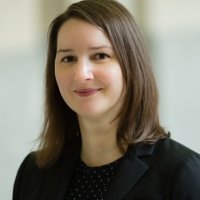Race, Racism, and Diversity in Slavic and Eurasian Studies
Over the past year, protests involving the Black Lives Matter Movement have spurred organizations and universities to engage in discussions of race, racism, and diversity in their workplaces and schools. The Slavic and Eurasian studies field is not immune to these conversations. Today, many in the field are coming to terms with problems such as a lack of racial diversity among educators and students, issues of visibility and vulnerability for minorities who travel to the region, and both real and perceived unequal treatment on behalf of people of color. As part of the Kennan Institute’s Black History Month programming, several experts came together to discuss the issues facing the Slavic and Eurasian studies field today and what can be done to create a more equitable and thriving field for all.
Selected Quotes
B. Amarilis Lugo de Fabritz
"Language proficiency is a prerequisite for proper work in the field, be it language, literature, history, political science. If you cannot communicate, if you cannot read original documents, if you cannot parse through Levada surveys, you cannot get your work done…[But on] January 22nd, 2019 the Chronicle of Higher Education published an article where they reported a survey by the Modern Language Association and they found that between 2013 to 2016, the United States lost 651 language programs."
"I’m Puerto Rican. My first language was Spanish. I started Russian in the late Soviet period because an English teacher in my high school taught it...Ever since, I’ve only met twelve other Puerto Ricans that teach in the field and they’re historians. How are we going to appeal to people when they know they’re going to be the only one [in the field]?"
"As scholars of color in the field, when we start talking about intersectionality, about ways that we can link our personal skills with scholarship, this is an issue. I know that as a graduate student, I at times was discouraged of using my Spanish skills to look at Soviet internationalism. We have this emerging number of young student coming up the pipeline that have these skills."
Kimberly St. Julian-Varnon
"When we’re trying to bring in students and we’re trying to create this pipeline between K-12 education to Russian language programs, and, you know, our regional language programs of studies into graduate school, if you do not see a person who looks like you, that is a big deterrent, because you do have that sense of isolation. I was lucky enough that I didn’t have to experience that isolation until I was already in graduate school. I had already joined in the past because Swarthmore [College] had other women, people who look like me who did Russian."
"I think what happens is when we get into these discussions of racism and race in the region, often it comes off as saying, 'You’re saying all of Russia’s racist, you’re saying Ukraine is racist.' That isn’t what we’re saying. What we’re saying is there are people who have racist beliefs in these regions, just like in the United States, and if you’re going to be sending and recruiting students of color to go to the region, we have to prepare them for their unique experiences. Also we need this responsibility to not just be on educators of color; it’s everyone’s job, if we’re going to have this field survive."
Krista Goff
"We sought to achieve a number of goals with this fall 2020 project [to build networks of support for undergraduate students of color]. At the first student meeting at Howard [University] in spring 2019, and at the second meeting in February 2020, participating students stressed how impactful it was for them to come together at these events and build fellowship and mentoring relationships, how powerful it was for them to see that they weren’t alone in the room...We wanted these programs to assist in creating horizontal networks across the cohort of participating undergraduate students as well as vertical ones that would link them to graduate students, faculty, non-academic professionals who could mentor them and help make Slavic and Eurasian studies feel less isolating for students and faculty of color in the future."
"The field needs to be more accountable to the people in the region that we’re studying, but we also need to be more accountable to ourselves and build a more racially equitable field, which doesn’t just benefit underrepresented students and faculty but the field as a whole. I think that that’s something that people still need to understand and we need to listen to how we can better support our students...It’s also about, as educators, educating ourselves, and it seems kind of basic, but learning about how we can better support our students, to take seriously their safety and their concerns and not be dismissive when they talk about fears that they might have, so it’s not just a passive thing but an active thing, that we need to be doing as educators at our universities."
Speakers


Assistant Professor of Russian and Soviet History, University of Miami

Introduction

President and CEO, US Russia Foundation
Moderator

Hosted By

Kennan Institute
The Kennan Institute is the premier US center for advanced research on Eurasia and the oldest and largest regional program at the Woodrow Wilson International Center for Scholars. The Kennan Institute is committed to improving American understanding of Russia, Ukraine, Central Asia, the South Caucasus, and the surrounding region though research and exchange. Read more
